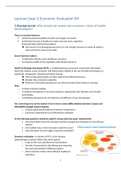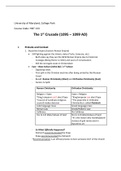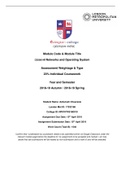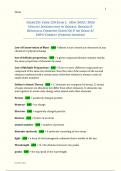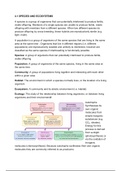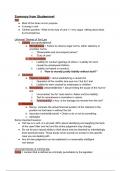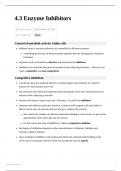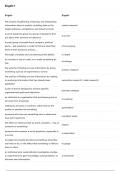Lecture Case 3 Economic Evaluation EH
1.Background: Why should we assess the economic value of health
technologies?
There is a tension between:
Limited financial possibilities (health care budget constraint)
(Unlimited) increase of healthcare needs and costs (new, expensive
treatment/interventions/innovations)
This tension is increasing because there are not enough resources to meet all society’s
need and choices have to be made
Goal of decision makers:
o To efficiently allocate scarce healthcare resources
o To maximise health of the population with limited resources
Health Technology Assessment (HTA): a multidisciplinary process that summarizes information
about the medical, social, economic, and ethical issues related to the use of health technology in a
systematic, transparent, unbiased and robust manner
Aims to help policymakers to make rational and efficient decisions.
Broader than economic evaluation
Present for both pharmaceutical as non-pharmaceutical interventions in Europe.
Aims:
o To inform decision making
o To improve the quality of care by promoting an appropriate and rationale use of health
technologies
o To facilitate planning for the introduction and diffusion of new technologies
For a new drug to be on the market it has to have a value (differentiation between 2 types) and
affordability (budget impact analysis)
o Clinical requirements (indirect treatment comparisons)
o Economic requirements (cost-effectiveness analyses)
So the following questions should be asked if a drug meets key payer requirements:
1. How much better does the innovation perform compared to Standard of Card (efficacy,
safety)?
2. Is the added value of the innovation worth the price?
3. Does the payer has the budget to pay the innovation?
Economic evaluation: is a branch of HTA, as for instance
epidemiological, judicial, ethical and social aspects.
o Looks at the costs and effects of interventions
o Provide a framework for identifying and comparing
the costs and benefits of different options
o Inform decision makers about efficient healthcare
allocation.
1
, Importance of health economic evaluation:
o Increased attention to issues of costs and efficiency
o Increased use of economic data in decisions about the reimbursement
(vergoeding/prestatie/terugbetaling) or pricing of health technologies (pharmaceutical
industry ask to include economic evaluation for reimbursement)
o Formal use of economic data (e.g. drug reimbursement)
o Fourth hurdle to market access (case 5)
2.Definition and types of economic evaluation
Economic evaluation: comparative analysis between two or more health technologies in terms of
costs and effects (outcomes).
-You look at differences in costs and outcomes and the relationship between them.
Different types of economic evaluation: if you meet the requirements above you will have a full
economic evaluation. However you can also have other economic evaluations wherein there is not a
comparison of two alternatives or were only the consequences or costs are taken into accounted
o Outcome description
o Cost description
o Cost outcome description
o Efficacy or effectiveness
o Cost analysis
o Full economic evaluation
Types of full economic evaluation:
1. Cost-minimization: identical in relevant aspects
2. Cost-effectiveness: in Natural units (clinical
endpoints, quality of life, satisfaction) -> fractures, patients with cancer (lot of possibilities)
3. Cost-utility: in Quality-adjusted life years (=generic outcome measure including quantity and
quality of life -> 1 year in perfect health)
4. Cost-benefit: in Euros (costs airport)
Cost-consequences are sometimes added to the types of economic evaluation, costs are
compared with different consequences.
Perspective = viewpoint of the analysis
Societal: healthcare costs, patient & family costs, productivity losses and costs in other
sectors -> recommended in the Netherlands
Healthcare: only include healthcare costs (hospital costs and costs for drugs) ->
recommended in the UK for example -> are most important costs here
Perspective depends on the objective and varies between countries.
3 steps for costing in a full economic evaluation:
1. Identification type of costs
2. Measurement of costs
3. Valuation of costs.
2
1.Background: Why should we assess the economic value of health
technologies?
There is a tension between:
Limited financial possibilities (health care budget constraint)
(Unlimited) increase of healthcare needs and costs (new, expensive
treatment/interventions/innovations)
This tension is increasing because there are not enough resources to meet all society’s
need and choices have to be made
Goal of decision makers:
o To efficiently allocate scarce healthcare resources
o To maximise health of the population with limited resources
Health Technology Assessment (HTA): a multidisciplinary process that summarizes information
about the medical, social, economic, and ethical issues related to the use of health technology in a
systematic, transparent, unbiased and robust manner
Aims to help policymakers to make rational and efficient decisions.
Broader than economic evaluation
Present for both pharmaceutical as non-pharmaceutical interventions in Europe.
Aims:
o To inform decision making
o To improve the quality of care by promoting an appropriate and rationale use of health
technologies
o To facilitate planning for the introduction and diffusion of new technologies
For a new drug to be on the market it has to have a value (differentiation between 2 types) and
affordability (budget impact analysis)
o Clinical requirements (indirect treatment comparisons)
o Economic requirements (cost-effectiveness analyses)
So the following questions should be asked if a drug meets key payer requirements:
1. How much better does the innovation perform compared to Standard of Card (efficacy,
safety)?
2. Is the added value of the innovation worth the price?
3. Does the payer has the budget to pay the innovation?
Economic evaluation: is a branch of HTA, as for instance
epidemiological, judicial, ethical and social aspects.
o Looks at the costs and effects of interventions
o Provide a framework for identifying and comparing
the costs and benefits of different options
o Inform decision makers about efficient healthcare
allocation.
1
, Importance of health economic evaluation:
o Increased attention to issues of costs and efficiency
o Increased use of economic data in decisions about the reimbursement
(vergoeding/prestatie/terugbetaling) or pricing of health technologies (pharmaceutical
industry ask to include economic evaluation for reimbursement)
o Formal use of economic data (e.g. drug reimbursement)
o Fourth hurdle to market access (case 5)
2.Definition and types of economic evaluation
Economic evaluation: comparative analysis between two or more health technologies in terms of
costs and effects (outcomes).
-You look at differences in costs and outcomes and the relationship between them.
Different types of economic evaluation: if you meet the requirements above you will have a full
economic evaluation. However you can also have other economic evaluations wherein there is not a
comparison of two alternatives or were only the consequences or costs are taken into accounted
o Outcome description
o Cost description
o Cost outcome description
o Efficacy or effectiveness
o Cost analysis
o Full economic evaluation
Types of full economic evaluation:
1. Cost-minimization: identical in relevant aspects
2. Cost-effectiveness: in Natural units (clinical
endpoints, quality of life, satisfaction) -> fractures, patients with cancer (lot of possibilities)
3. Cost-utility: in Quality-adjusted life years (=generic outcome measure including quantity and
quality of life -> 1 year in perfect health)
4. Cost-benefit: in Euros (costs airport)
Cost-consequences are sometimes added to the types of economic evaluation, costs are
compared with different consequences.
Perspective = viewpoint of the analysis
Societal: healthcare costs, patient & family costs, productivity losses and costs in other
sectors -> recommended in the Netherlands
Healthcare: only include healthcare costs (hospital costs and costs for drugs) ->
recommended in the UK for example -> are most important costs here
Perspective depends on the objective and varies between countries.
3 steps for costing in a full economic evaluation:
1. Identification type of costs
2. Measurement of costs
3. Valuation of costs.
2

